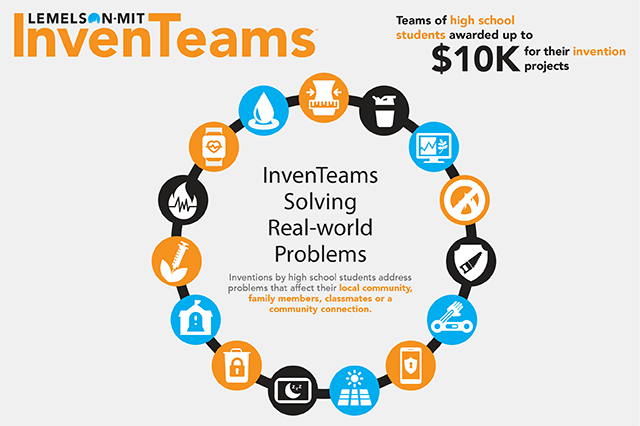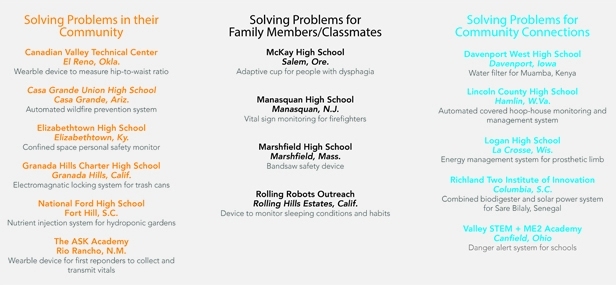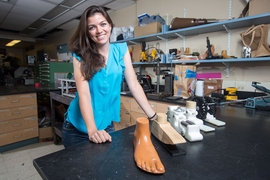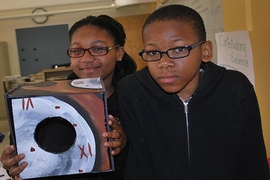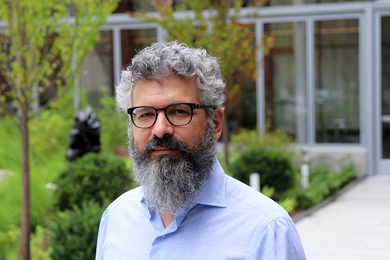The Lemelson-MIT Program has announced the 2018–2019 InvenTeams, 15 teams of high school students nationwide, each receiving up to $10,000 in grant funding to solve problems they’ve recognized from their local communities. This year’s InvenTeam projects include the invention of a danger alert system for schools, a personal safety monitor to prevent injuries and fatalities for workers and rescuers in confined spaces, and a vital sign monitoring system for firefighters to prevent the risk of overexertion during fire rescues.
InvenTeams, now in its 15th year as a national grants initiative, inspires youth to invent technological solutions to real-world problems of their own choosing. The 2018–2019 InvenTeams are composed of students, teachers, and community mentors that will pursue year-long invention projects. The InvenTeam initiative engages students in creative thinking, problem solving, and hands-on learning opportunities in science, technology, engineering, and mathematics (STEM). InvenTeams apply their knowledge and experiences to build an invention that will be showcased at EurekaFest at MIT in June 2019, and after a technical review within their home community in February 2019.
“I’m excited by the enthusiasm of InvenTeam students,” says Stephanie Couch, executive director of the Lemelson-MIT Program. “InvenTeam participants are now over 40 percent female, which is encouraging in a time when women are underrepresented in the STEM fields and among patent holders. Hands-on learning programs that reach young women and men to work on invention projects like the InvenTeam initiative ensure that we continue to develop the creative and inventive mindsets that prepare students for success in both their education and careers in a rapidly changing world.”
“This year’s projects show that young Americans are motivated to improve the lives of others through invention,” says Leigh Estabrooks, the Lemelson-MIT Program’s invention education officer. “While we celebrate the young inventors and their desire to help others, we realize that they are led by exceptional teachers. Supporting the teachers is of utmost importance to the program. We are pleased to announce the launch of an online community for not only our InvenTeam teachers but teachers across the world interested in working with similarly motivated inventive youth. Everyone can be inventive but our teachers need our help and a community of support.”
LemelsonX will support any teacher interested in learning from previous InvenTeam teachers and invention educators about the different ways of helping young people to invent.
Meet the 2018–2019 InvenTeams
The InvenTeams are located in 13 different states, with the state of South Carolina and Kentucky receiving its first InvenTeam grants. The invention projects were selected by a respected panel from the Cambridge and Boston area consisting of university professors, inventors, entrepreneurs, intellectual property lawyers, industry professionals, and college students. The team projects address problems that affect their local community, family members, classmates or a community connection.
Solving Problems in their Community
- Canadian Valley Technical Center (El Reno, Oklahoma): Wearable device to measure hip-to-waist ratio
- Casa Grande Union High School (Casa Grande, Arizona): Automated wildfire prevention system
- Elizabethtown High School (Elizabethtown, Kentucky): Confined space personal safety monitor
- Granada Hills Charter High School (Granada Hills, California): Electromagnetic locking system for trash cans
- National Ford High School (Fort Mill, South Carolina): Nutrient injection system for hydroponic gardens
- The ASK Academy (Rio Rancho, New Mexico): Wearable device for first responders to collect and transmit vitals
Solving Problems for Family Members/Classmates
- McKay High School (Salem, Oregon): Adaptive cup for people with dysphagia
- Manasquan High School (Manasquan, New Jersey): Vital sign monitoring for firefighters
- Marshfield High School (Marshfield, Massachusetts): Bandsaw safety device
- Rolling Robots Outreach (Rolling Hills Estates, California): Device to monitor sleeping conditions and habits
Solving Problems for Community Connections
- Davenport West High School (Davenport, Iowa): Water filter for Muamba, Kenya
- Lincoln County High School (Hamlin, West Virginia): Automated covered hoop-house monitoring and management system
- Logan High School (La Crosse, Wisconsin): Energy management system for prosthetic limb
- Richland Two Institute of Innovation (Columbia, South Carolina): Combined biodigester and solar power system for Sare Bilaly, Senegal
- Valley STEM + ME2 Academy (Canfield, Ohio): Danger alert system for schools
Calling all young inventors!
The Lemelson-MIT InvenTeam application for the 2019–2020 school year is now available at http://lemelson.mit.edu/inventeams.
Teams of high school students, teachers and mentors are encouraged to apply now through April 8, 2019.
